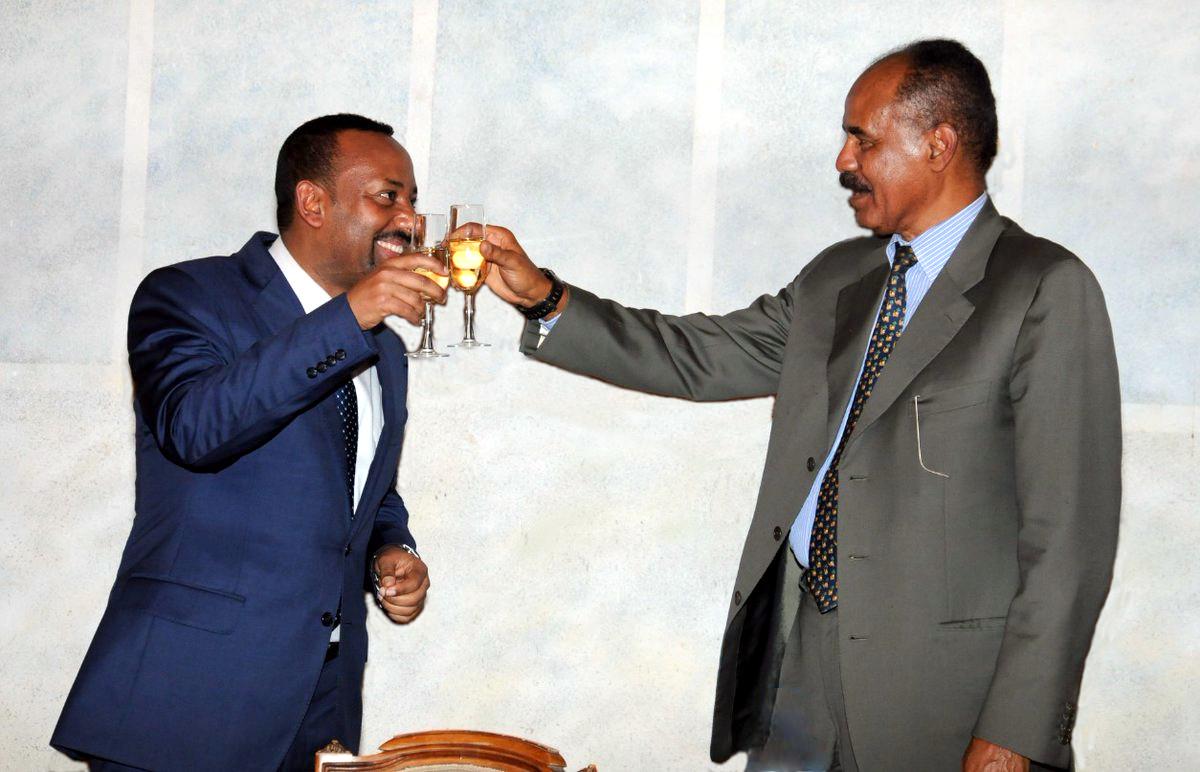Isaias out of character: Why Eritreans are getting nervous
2018-07-19 17:35:04 Written by Abraham T. Zere Published in English Articles Read 2124 timesBy Abraham T. Zere
In barely the blink of an eye, Eritrea’s unpredictable president has completely reversed his rhetoric of the past two decades.

Ethiopia’s PM Abiy Ahmed and Eritrea’s President Isaias Afewerki at an official dinner in Asmara. Credit: Yemane Gebremeskel, Minister of Information, Eritrea.
In just a few weeks, relations between Ethiopia and Eritrea have not just shifted dramatically but – in many ways – turned upside down.
For two decades, President Isaias Afwerki had demonised Ethiopia, seeing it as an existential threat. He used the supposed Ethiopian menace as a pretext to establish one of the world’s most repressive regimes, ban widespread freedoms, and impose indefinite military conscription. Some of the only bits of music to get official approval from Asmara were toxic war songs that reinforced this all-encompassing enmity on which the nation’s identity was based.
Now, this could not have flipped more completely. In the past month, Ethiopia’s Prime Minister Abiy Ahmed and President Isaias have embraced warmly in both Asmara and Addis Ababa, greeted by huge doting crowds. Eritrean praise-singers have literally changed their tunes to praise peace in Amharic and Tigrinya. Today, the first flight between the two countries in 20 years landed in Asmara, carrying a fully-booked plane that included Ethiopia’s former Prime Minister Hailemariam Desalegn.
In barely the blink of an eye, full-throated enmity seems to have turned into whole-hearted love – to the extent that hopeful Eritreans, whose lives have long been determined by the mood of one man, are starting to worry.
Given the opaque way in which the regime governs, Eritreans are used to following Isaias’ words and actions carefully in search of any hints. But for even those unaccustomed to observing him, his recent performance in Ethiopia was startlingly. He appeared out of character, praising the leader of his long-time foe excessively, and proclaiming that the two nation’s populations are “one people”. He then remarkably told Abiy “you are our leader” and announced happily to the crowd: “I’ve given him all responsibility of leadership and power”.
It was not long ago that it was almost unthinkable that Isaias – a man who played a leading role in Eritrea’s battle for independence and based his leadership on the need to protect against Ethiopia – might one day shake hands with his counterpart in Addis. But now, some Eritreans are afraid that the president might be about to declare Eritrea reunited with Ethiopia.
Petitions have reportedly been started and demonstrations called. There are claims being circulated on social media that certain army commanders have said that Isaias has compromised Eritrea’s national interest and should not be allowed home.
[Ethiopia-Eritrea peace: Some unanswered questions]
[Resolving the Ethiopia-Eritrea border: What actually needs to be done?]
[Ethiopia and Eritrea: Turning the promise of peace into the real thing]
The unthinkable
Amidst all this uncertainty, one thing that is clear is that the former status quo has been broken. So many of the regime’s actions were justified by referring to Ethiopian hostility, but this pretext no longer exists.
If we are to follow the logic previously laid out by Isaias, Eritrea should now be able to undergo a dramatic and rapid transformation. There have already been some swift changes, such as the opening up of telecommunications and flight routes, but there ought to be much more to come.
There should, in theory, no longer be the need for such a large army and the oppressive system of indefinite military service. Political prisoners and jailed journalists should be freed now they no longer pose a national security threat as the government had claimed. The border should be opened up and trade resumed. And people should be allowed to move freely both within and out of the country.
Eritreans are eagerly listening out for any signs that these moves may be coming, but the government is remaining characteristically quiet on these fronts. If it were to try to resume normal life in the country, however, it would take quite some time. Thanks to the government’s short-sighted and reclusive policies for two decades, the state has been reduced to a mere shell. Institutions have been dismantled over the years and power has been concentrated into the hands of a few. Those with authority are old and incapable of overseeing dynamic change, while the country loses thousands of young people every month as they flee across the border.
If Isaias is genuine in his desire for change, he could use the justification that “new blood” is needed – as he did in 1994 – to overhaul the government, removing senior officials and go after those accused of corruption. He might also place the blame for abuses and mistakes on military commanders and dispose of them. He could try to transfer power to the next generation. But he would face the problem that there is huge gap between the old and young, while decades of alienation have made most people feel like mere observers in their own affairs.
Finally, even with all these changes, the elephant in the room would remain: the same capricious individual responsible for creating one of the world’s most repressive regimes – involving systemic torture, the imprisonment of opponents and much more – would still reign supreme.
In reality, the only way that Eritrea can meaningfully move forwards now is for President Isaias to step down after a quarter of a century in control. If he did take such a courageous step, he might be remembered for playing a positive role in Eritrea’s history. Both of these things seem unthinkable. But recently, the unthinkable has been happening.
Source=http://africanarguments.org/2018/07/18/why-eritrea-nervous-isaias-abiy-ethiopia/




















